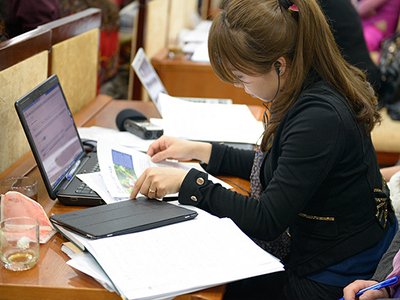Article by Dr Gabriela Whitehead, Head of Digital Transformation and Process Management at GISMA Business School.
 Vocational training and academic qualifications have specific characteristics that can be perceived as pros or cons, depending on the particularities of the job for which the applicant is being considered.
Vocational training and academic qualifications have specific characteristics that can be perceived as pros or cons, depending on the particularities of the job for which the applicant is being considered.
From the individual’s perspective, the decision to either follow vocational training or pursue an academic qualification is influenced by several factors, such as financial means, options available and personal preference. However, individuals can enroll to a higher education institution at a later stage in their life as their personal situation changes or as their interest and abilities mature within a particular area or activity.
For the employers, a given role may require the additional know-how and personal skills that are usually associated with academic qualifications and which may not only refer to the course or programme of study.
Vocational training focuses on a specific set of skills to prepare the individuals to a particular job or area of the business. Academic qualifications, on the other hand, involve other areas of learning that can be considered as the foundation for different positions, making it easier, in terms of corporate resources, to provide cross-training within the organization.
This may be particularly valid for knowledge workers as individuals acquire general skills that can be transferred to different roles and even industries, as opposed to skills that are tailored to a given kind of activity as it is the case of vocational training. Under the current circumstances, this difference may have a remarkable impact on the economic survival of many firms.
The ongoing coronavirus pandemic has changed the world of work as well as the job market, meaning that both job seekers and employers need to critically evaluate their vision and goals, align them with the current situation and define actions to take that are financially sustainable.
For instance, the possibility to undertake vocational training may be currently limited due to local lockdowns, government regulations and reduction of the workforce. Whereas the options to pursue academic qualifications continue to be available via online delivery or hybrid formats of online and face-to-face teaching. At the same time, many higher education institutions around the globe are offering initiatives to support students with their payment plans to help finance their career.
The decision is for the individuals, to choose what suits their personal circumstances at a given point in their professional career; however, it is important that from the side of the employers the options are also open to consider applicants for their unique mix of skills and personal experience and how these are aligned with the role and the overall business goals.
About the author
Gabriela joined the GISMA team in October 2019 as Head of Digital Transformation and Process Management. She works on data integration and decentralisation to optimise the databases, systems and processes used across all departments and services at GISMA Germany.
Gabriela holds a PhD and an MSc in Communication, Media and Marketing with a specialisation in Employee International Mobility. Gabriela pursued both degrees as a remote student while starting a family and relocating internationally several times.
WeAreTheCity covers the latest female centric news stories from around the world, focusing on women in business, careers and current affairs. You can find all the latest gender news here.
Don’t forget, you can also follow us via our social media channels for the latest up-to-date gender news. Click to follow us on Twitter, Facebook, Instagram, and YouTube.








